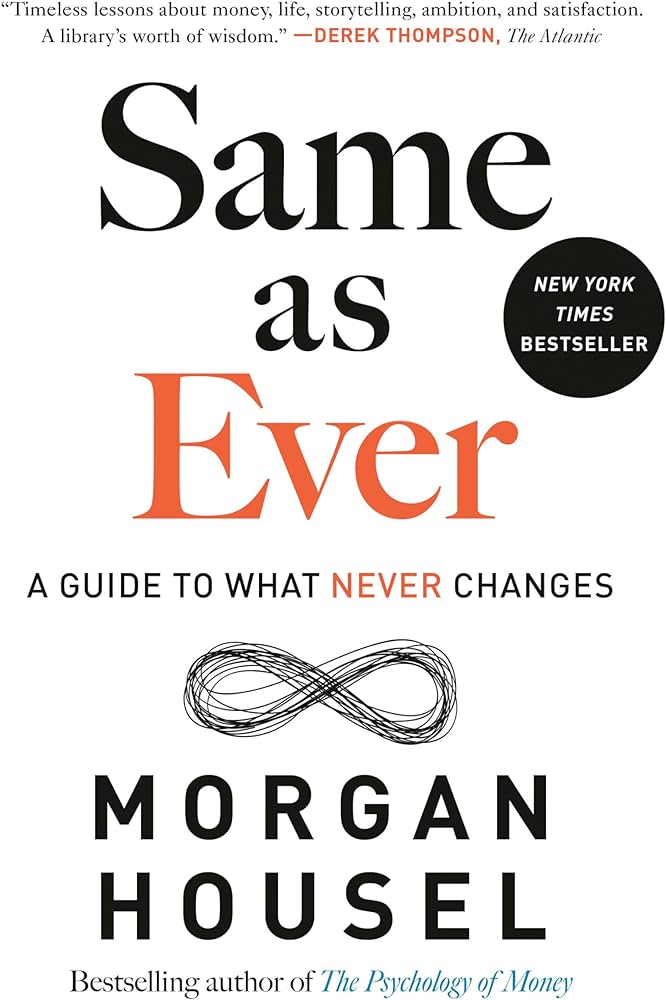Morgan Housel wrote the fantastic Psychology of Money so I was looking forward to Same as Ever and even though it's different, I wasn't disappointed.
The format was something I liked particulary well. No chapter is longer than 10 minutes. Every chapter flows into the next one and Housel manages to create a "just one more" feeling that is rarely seen in non-fiction books.
The content wasn't life-changing but still interesting and thought provoking. Essentially, it's a list of things that never change and the underlying advice to keep concentrate on those, instead of trying to stay afloat in an ever-growing flow of information and complexity.
Here are a few things that tickled my brain:
Every event creates its own offspring, which impact the world in their own special ways. It makes prediction exceedingly hard. The absurdity of past connections should humble your confidence in predicting future ones.
I can promise you that will be the case going forward. The biggest risk and the most important news story of the next ten years will be something nobody is talking about today. No matter what year you’re reading this book, that truth will remain. I can say that confidently because it’s always been true. The fact that you can’t see it coming is exactly what makes it risky.
Montesquieu wrote 275 years ago, “If you only wished to be happy, this could be easily accomplished; but we wish to be happier than other people, and this is always difficult, for we believe others to be happier than they are.”
If you look at the 1950s and ask, “What was different that made it feel so great?” this is at least part of your answer. The gap between you and most of the people around you wasn’t that large. It created an era when it was easy to keep your expectations in check because few people in your social circle lived dramatically better than you did. Many (but not all) Americans could look around and find that not only were they living comfortable lives, they were living lives that were just about as comfortable as those around them whom they compared themselves to.
Psychologist Jonathan Haidt says people don’t really communicate on social media so much as they perform for one another. You see the cars other people drive, the homes they live in, the expensive schools they go to. The ability to say, I want that, why don’t I have that? Why does he get it but I don’t? is so much greater now than it was just a few generations ago.
When asked, “You seem extremely happy and content. What’s your secret to living a happy life?” ninety-eight-year-old Charlie Munger replied: The first rule of a happy life is low expectations. If you have unrealistic expectations you’re going to be miserable your whole life. You want to have reasonable expectations and take life’s results, good and bad, as they happen with a certain amount of stoicism.
I think it’s often hard to distinguish high expectations from motivation. And low expectations feels like giving up and minimizing your potential.
A one-hundred-year event doesn’t mean it happens every one hundred years. It means there’s about a 1 percent chance of it occurring in any given year. That seems low. But when there are hundreds of different independent one-hundred-year events, what are the odds that one of them will occur in a given year? Pretty good. If next year there’s a 1 percent chance of a new disastrous pandemic, a 1 percent chance of a crippling depression, a 1 percent chance of a catastrophic flood, a 1 percent chance of political collapse, and on and on, then the odds that something bad will happen next year—or any year—are . . . not bad.
There is too much information in the world for everyone to calmly sift through the data, looking for the most rational, most correct answer. People are busy and emotional, and a good story is always more powerful and persuasive than ice-cold statistics.
It’s good to always assume the world will break about once per decade, because historically it has. The breakages feel like low-probability events, so it’s common to think they won’t keep happening. But they do, again and again, because they’re actually just smaller high-probability events compounding off one another.
Psychologist Amos Tversky once said that “the secret to doing good research is always to be a little underemployed. You waste years by not being able to waste hours.” A successful person purposely leaving gaps of free time on their schedule to do nothing in particular can feel inefficient. And it is, so not many people do it. But Tversky’s point is that if your job is to be creative and think through tough problems, then time spent wandering around a park or aimlessly lounging on a couch might be your most valuable hours. A little inefficiency is wonderful.
It’s not about working less. It’s the opposite: A lot of thought jobs basically never stop, and without structuring time to think and be curious, you wind up less efficient during the hours that are devoted to sitting at your desk cranking out work. This is the opposite of the concept of “hustle porn,” where people want to look busy at all times because they think it’s noble.
This is one of the most useful life skills—enduring the pain when necessary rather than assuming there’s a hack, or a shortcut, around it.
The typical attempt to clear up an uncertain future is to gaze further and squint harder—to forecast with more precision, more data, and more intelligence. Far more effective is to do the opposite: Look backward, and be broad. Rather than attempting to figure out little ways the future might change, study the big things the past has never avoided.


